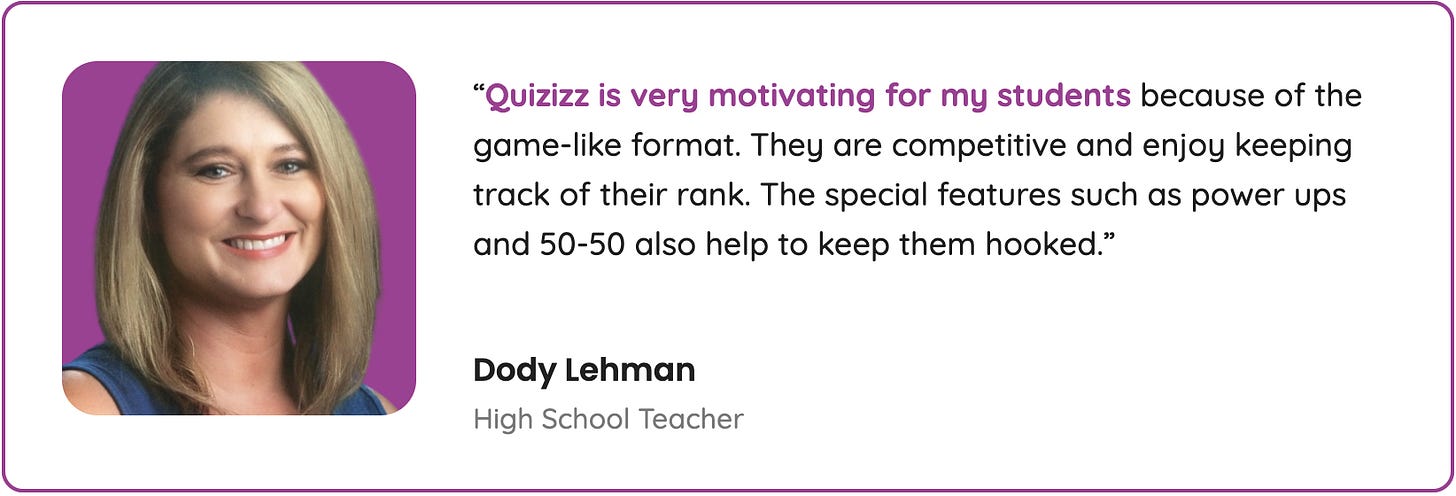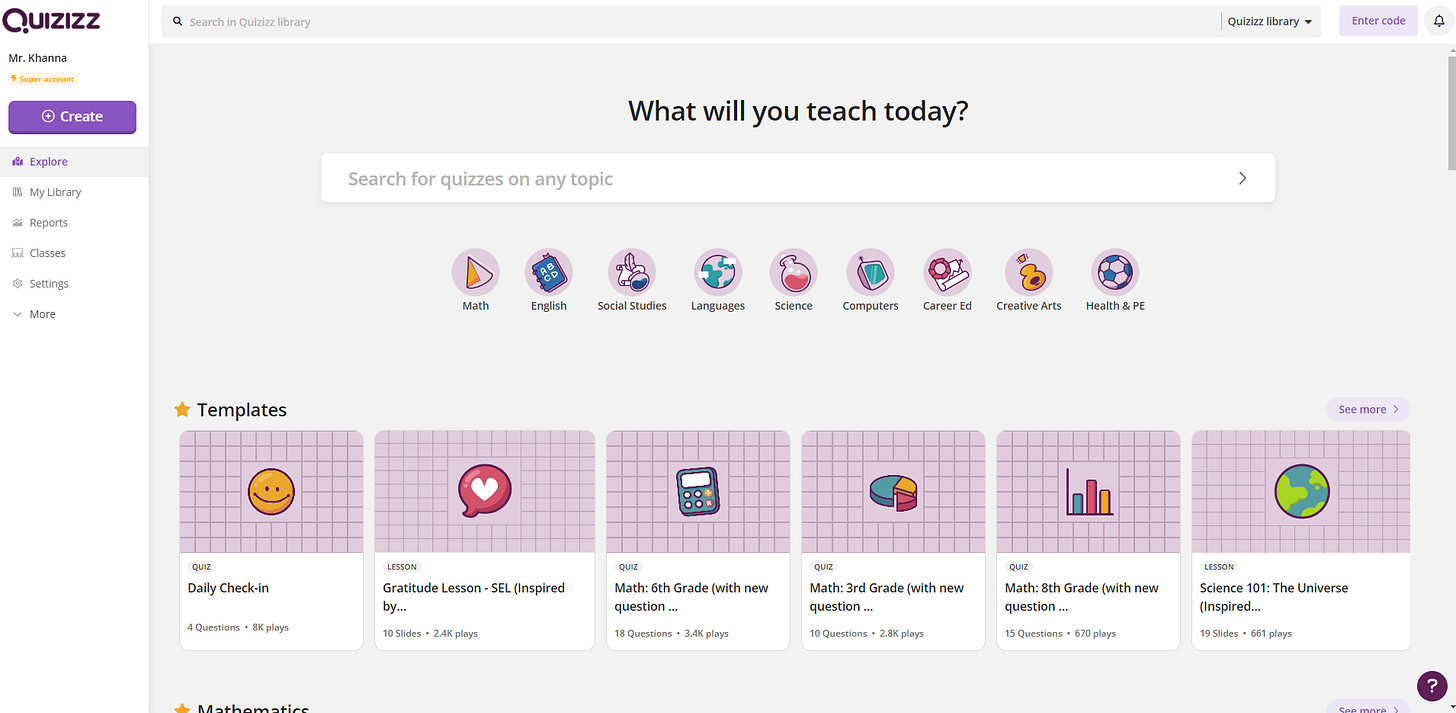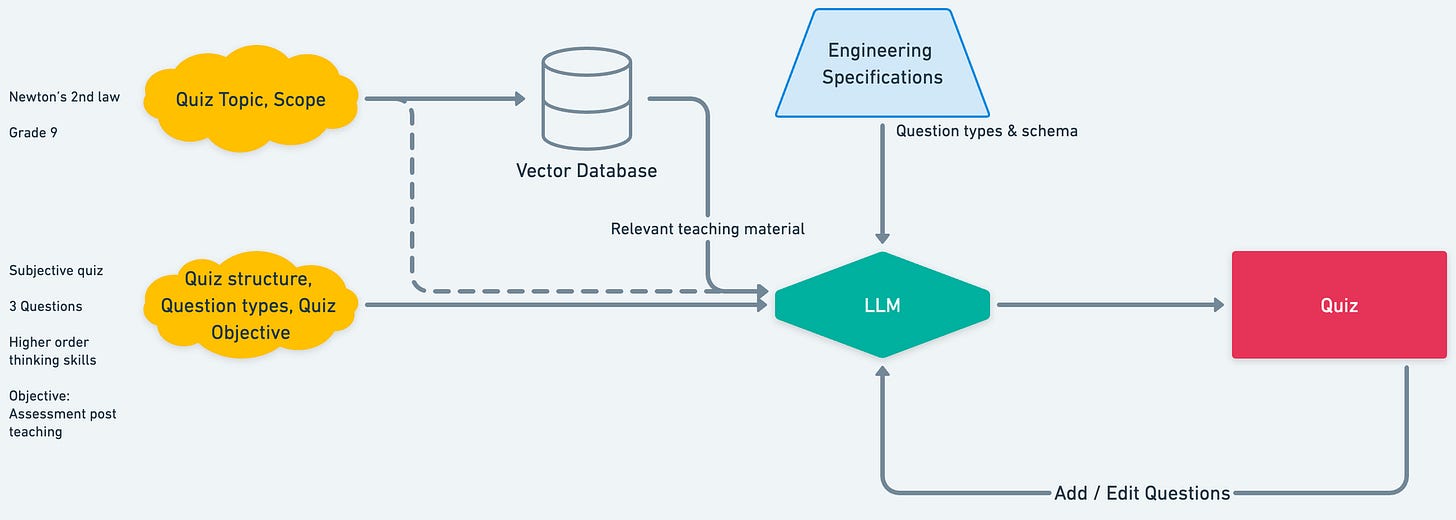Hello and welcome to the inaugural issue of The AI Roadmap. Every 7-10 years, a new computing platform emerges, introducing capabilities that outpace the previous platforms. Generative AI is another such platform unveiling its potential as we write this. While the world of AI is bustling with discussions on GenAI, we felt there were little to no resources to start thinking about how we can use GenAI to serve customers better.
Here at The AI Roadmap, we strive to bridge this gap by tying these ideas to real-world examples (existing companies). We start by understanding how customers interact with a given product, and then delve into potential short-term and long-term AI-led solutions that can be implemented.
Our first exploration is of Quizizz, an innovative ed-tech company that elevates classroom learning by helping teachers create fun and interactive quizzes. Here's what we will cover in this issue:
A brief overview of Quizizz, why we chose it, and a first-principles understanding of the role of quizzes in education
Our mental models around AI and LLMs, their potential applications, and limitations
Discussion on potential short-term (incremental) and long-term (moonshot) AI-First solutions for quizzing platforms
Why we believe Quizizz is best positioned to win
We promise to provide in-depth, engaging discussions on each topic. We believe that understanding the details is key to truly grasping these ideas. So, let's embark on this journey of crafting the AI roadmap together, one edition at a time. We're excited to have you with us and we look forward to hearing your thoughts.
A Quick Look at Quizizz
Quizizz is a learning platiform designed to bring fun, interactivity, and engagement to classrooms. Serving as a "technology co-pilot" for teachers, Quizizz offers multiple tools that enhance the teaching and learning experience.
For teachers, Quizizz simplifies the task of creating and delivering quizzes. It not only saves time and effort but also generates actionable insights on students' performance. For students, it turns learning into a game-like experience, making it more enjoyable and improving retention. Together, these features enhance overall learning outcomes.
Quizizz claims a presence in over 80% of U.S. schools and spanning across 50 million educators worldwide, and have remained laser-focused on solving the problem of improving learning in schools, where students spend 7+ hours daily, aiming to become the school operating system.
Quizizz also offers a product called “Quizizz for Work”, which we will set aside for now in the interest of simplicity.
They make money by offering subscription services to individual teachers, schools, as well as districts.
To keep things simple, this article will primarily focus on the quizzing aspect of Quizizz. While there's plenty more to discuss regarding lesson delivery formats, alternate instruction strategies, and more, we'll save those for future articles when we feature other companies that specialise in those areas.
The value Quizizz brings to classrooms is clear when you listen to the teachers who use it. Here's what some of them have to say:
Understanding Capabilities and Limitations for GenAI Models
As we discuss various use cases where Generative AI can be beneficial, it is important to note capabilities and limitations for GenAI Models.
GenAI models are trained on large data corpuses to achieve a particular objective. Fundamentally, they are probabilistic(LLMs, for eg, predict the next word by identifying patterns in language based on statistical models).
They showcase a wide range of capabilities like comprehension, synthesis, and reasoning (to an extent). However, they struggle with tasks requiring comprehension of new concepts or up-to-date information. For example, ChatGPT, trained on data only up until 2021, is unaware of events or developments that happened later and confidently 'hallucinates’.
As product builders, we have to understand these capabilities and limitations and craft innovative strategies to best utilise what these models have to offer.
Why did we choose Quizizz as the first company?
Our aim is to depict the impact of AI on specific industries. We decided starting with edtech, because it’s a sector we are intimately familiar with, given our backgrounds as Edtech PMs.
You might be asking then, why did we chose to focus on Quizizz out of all the edtech companies out there? Well, it's not because they've sponsored us!
In a rapidly evolving edtech landscape, brimming with innovative companies, we needed a focused approach for our selection. Hence, we established three criteria:
Well-defined primary use case: The company should address a unique primary problem, providing a focal point for our discussions.
Successful business model: The company needs a proven business model, backed by a substantial customer base. This focus helps us avoid speculative problems while allowing data-driven exploration, which is vital for crafting AI-powered solutions.
Tech-centric (Non-operational): At present, GenAI models can't significantly assist with physical tasks, so our emphasis is on companies where technology is central to their operation.
Quizizz fit these criteria exceptionally well. As we move forward, we look forward to covering other intriguing companies in our future editions.
Why are Quizzes used? - Taking a first principles lens
Quizzes serve 3 key functions:
Knowledge Assessment: Gauging students’ understanding and proficiency in a subject or a skill.
Performance Benchmarking: Evaluating student performance relative to peers.
Catalysts for Mastery: Quizzes help identifying knowledge gaps and enabling students & teachers to direct their learning efforts towards mastery of the subject.
(1) and (2) require some form of Standardisation to ensure a fair and consistent performance evaluation.
(3) requires Adaptability i.e, personalising the quiz as per student’s skill level to ensure the challenges are neither too easy nor too hard.
Mapping the Quizizz Experience: Identifying AI-First Solutions
In this section, we'll explore how users currently interact with Quizizz, identify the challenges they face and try to uncover any new opportunities where AI can elevate the Quizizz experience. For each identified challenge and opportunity, we’ll propose short-term and long-term solutions, along with implementation details for a few.
Touchpoint 1: Creating a quiz
How it works today: Teachers choose an existing quiz from the Quizizz library or start from scratch. Subsequently, they adjust or add questions according to their objectives.
Touchpoint 2: Conducting and Attempting Quizzes
How it works today: A teacher starts a quiz, students begin answering the questions, and as they progress, the teacher can see their answers in real-time. The experience is interactive and fun for the students.
Touchpoint 3 - Reviewing Quiz Performance
How it works today: Teachers get a summary and a detailed view of each student's performance. This information is valuable, but applying it to future lesson plans or homework assignments can be difficult.
Challenges / Opportunities for each touchpoint
AI-First Solutions for each challenge / opportunity
It is time-consuming to adjust a quiz from Quizizz library as most questions don’t match my requirement” (Teacher)
Customised quizzes generated for each teacher request with Templatised Prompts: Using templatised prompts, defined by the Quizizz team, teachers need to input specific parameters for their quizzes like topics, difficulty level, style of questions, and quiz objectives. With this information, LLMs can generate a tailored quiz for each teacher's request, which only needs verification by the teacher. This approach not only saves the teacher's time from having to sift through multiple questions but also ensures the quiz fits their requirements.
By employing Vector Embeddings, quiz generation can be further refined and limited to a specific question bank or source. This streamlines the quiz content and reduces teacher verification time even more.
Additionally, For self-study purposes, LLM can also help students create quizzes. By inputting specific study prompts, students can get a quiz generated just for them.
“I avoid subjective questions because grading them takes a lot of time” (Teacher)
Rule-based Evaluation: LLMs enable understanding and evaluating a student's open-ended responses, which can be compared against a set of scoring rules defined by the teacher. This enables teachers to ask subjective questions, while not having to worry about significantly high time spent in grading them.
Traditionally, quizzes have been restricted to question types that are easy to evaluate (MCQs, matching, matrix, etc.). We propose a move towards more engaging, higher-order thinking question formats.
For e.g. Debate and Reasoning Questions: Debates foster critical thinking, promote in-depth understanding, and discourage rote learning. With LLMs, these question types can be scaled. Find a quick and dirty AI debate coach implementation design below.
“Same quiz can be easy for some students and hard for other students” (Teacher)
Customizing Quizzes for each student
For each question or concept, questions of different levels can be pre-generated as per given frameworks like Bloom’s taxonomy. The quiz can then be adapted such that questions are of just the right difficulty level for the students. Model can also account for student’s response and evaluate the gap in student’s understanding; using which it can further personalise the quiz for each student. This level of adaptiveness can significantly redirect the emphasis from mere evaluation towards mastery of a subject.
“I always enjoy doing a Quizizz activity because it's fun.” (Student)
To enhance the elements that teachers and students already love, we propose solutions to enhance interactivity and cultivate a collaborative learning environment.
Elevating Interactivity with Role-Playing: We can use GenAI to make learning more engaging by introducing relatable characters. For instance, during history lessons, students could "travel in time" and chat with Abraham Lincoln, or their favourite cartoon character can teach them about Newton’s laws.
Elevating Collaborative Learning with AI-Led Activities: While group debates enhance comprehension, teacher time constraints often limit their frequency in classrooms. AI can address this issue by efficiently moderating debates and facilitating peer-learning at scale in small groups, encouraging students to explain their quiz answers, and promote peer learning.
“I find it hard to understand Data and Acting upon it” (Teacher)
When paired with other analysis tools, Large Language Models (LLMs) can enhance educational data analysis through their language processing abilities. They offer two key benefits:
More nuanced data: They help unlock analysis of subjective responses, reveal hidden patterns, highlight common student challenges, and identify misconceptions.
Better actionable insights : With knowledge about the learning material and student responses, LLMs can offer better actionable insights to teachers.
These benefits come into play in the following scenarios:
In-Depth Class and Quiz Analysis: LLMs can access more data points than before, offering a detailed view of class and quiz performance, leading to more actionable feedback.
Improving Teaching Effectiveness: By helping teachers identify which teaching style is more effective for specific topics or questions, LLMs can suggest methodological adjustments, thereby enhancing teaching efficacy.
I’d love to give personalised Inputs to all students but it is very time-consuming.” (Teacher)
Personalized Feedback for Each Student: With a dynamic understanding of each student's learning style and proficiency level, LLMs can help personalize study materials and review methods on a large scale, a task that would be incredibly difficult without AI.
More Ideas to Explore
Going beyond the traditional user journey, we have identified several ideas that we believe can contribute to expanding Quizizz's user base and upselling services to schools. These ideas are explained below:
Aimed at Growth in user base:
Multilingual and Cultural Adaptation: By understanding multiple languages and cultural nuances, LLMs can help Quizizz engage diverse users and open new geographical markets.
Inclusivity: AI can provide personalised support for students with special needs, ensuring an accessible learning journey for all.
Free organic Tools: The potential solutions discussed above could serve as great tools for users to get a taste of what Quizizz offers, thus attracting them to the platform.
Lifelong Learning and Upskilling: Catering to non-student users, LLMs can create quizzes on a vast range of topics beyond academics, tapping into the lifelong learning and professional development market.
Upselling to schools with Innovating Learning Strategies and Admin level Insights
Scientific Learning Strategies
The integration of LLMs will allow Quizizz to introduce or enhance scientific learning methods like spaced repetition, interleaving, etc. For example, LLMs can make spaced repetition significantly better by accommodating subjective questions, providing contextual information (unlike conventional flashcards), and making a variety of questions about the same topic.
Insights for Administrators:
LLMs can also aid decision-making at the administrative level. They can carry out detailed comparative analysis, giving principals and department heads the ability to assess and compare the effectiveness of different teachers. An LLM could reveal, for instance, that students of Teacher A generally solve questions up to Level 3 of Bloom's Taxonomy, while students of Teacher B struggle to surpass Level 2. Such insights can guide targeted support and improvements.
This expansive potential of GenAI is truly exciting. Solutions mentioned above can potentially illuminate the path to a more inclusive, comprehensive, and effective approach to education - but this is just the beginning. We believe there's room for even bigger dreams and transformative ideas.
Moonshot Ideas: Envisioning the Unseen in Education
In our ongoing exploration of the intersections between AI and Quizzing, we've spoken at length about how AI can enhance the existing use cases. Yet, there's another side to the story - what if the future is not about mere improvements but a dramatic transformation of how we think about education? This is where our 'moonshot' ideas come into the picture.
A 'moonshot', by its nature, involves looking beyond the current needs or use cases and imagining a future that fundamentally disrupts the status quo. For eg, “Will Quizzing even exist in its current form if the education landscape undergoes a drastic shift?” or “Could we imagine a completely new way to understand and measure learning?”.
With the rapid advancements in AI, we envision 3 interesting moonshot ideas:
Moonshot Idea 1: From Passive Consumption to Active Learning Conversations
Let's envision a future where learning mechanisms are transformed, traditional quizzes evolve and textbooks become a thing of the past. This shift opens doors to a new learning experience:
Interactive Learning Materials: Static books make way for dynamic AI-enabled learning companions. Now, students don't just read a book - they engage in a conversation with it. Learning companions guide learners to systematically explore the subject matter while maintaining focus on specific topics.
Active Learning: Students learn to ask good questions, explain concepts in their own words, and think deeply about what they're learning.
Evolving Quizzes: Quizzes evolve from standalone assessment tools into interactive learning checkpoints. They adapt to learners' responses in real-time, ensuring better understanding and knowledge retention.
Example: Active Learning Journey with Newton's Third Law
Consider a student studying Newton's Third Law of Motion. Instead of simply reading a chapter, they're engaged in a dialogue with their AI-powered learning companion. As they discuss why a balloon flies away when let go, the AI guides them to connect this with Newton's Third Law in a conversational manner.
The student is not just a passive consumer but an active participant, encouraged by the learning companion to critically question and comprehend. The tool adjusts the discussion if they struggle with a concept, presenting different perspectives or related examples until the concept is well-understood.
This moonshot idea envisions an engaging and effective learning experience where students actively drive their educational journey.
Moonshot Idea 2: An Application Based Approach to Learning and Assessment
Building upon our first moonshot idea, we can extend the interactive learning approach into assessments. We envision a world where traditional quizzes are replaced by dynamic, practical learning experiences.
Imagine an interactive game based on Newton's Third Law. The game would prompt students to apply their understanding practically – for example, predicting the trajectory of a rocket based on the force exerted. This game-based assessment method would evaluate theoretical knowledge as well as application skills in a fun & engaging way.
Moonshot Idea 3: Hyper-personalisation - Tailoring Education to Each Learner
Taking cues from the first two moonshots, let's envisage an even more refined learning experience - a future where education is hyper-personalised. In this scenario, an AI 'sensei' tailors a distinct learning journey for every student, aligning it with their interests, strengths, and learning styles. The AI assists learners in discovering their passions and subsequently, in specialising in their chosen domain.
Here’s how the journey would look like:
Identifying Interests and Strengths: Our AI 'sensei' assists each learner in exploring diverse fields and topics, enabling them to discover their unique interests and strengths.
Personalised Learning Pathways: Post identification, the AI crafts a tailored learning path that adapts and grows with the learner, ensuring a personalized educational journey.
Achieving Mastery: The AI assists learners in delving deeper into their areas of interest, providing the tools and resources needed to achieve mastery.
Constant Learning Companion: The AI 'sensei' remains a steadfast companion throughout, offering real-time feedback, guidance, and personalised modifications to the learning pathway.
Our aim would be to shift from a one-size-fits-all model to a learner-centric approach, where the educational journey of each student is shaped by their interests, strengths, and unique learning styles.
These moonshot ideas together represent our vision for a radically reimagined future of education – one that is interactive, engaging, personalised, and above all, learner-centric. As of now, these ideas might seem distant, yet, they are not unachievable.
Leaving the realm of these futuristic ideas, let's circle back to Quizizz. Now we ask if Quizizz is well-positioned to make a significant mark in this transformative journey?
Why is Quizizz Best Positioned to Win This Space?
In a future shaped by generative AI, where standard aspects like content creation are set to be democratised, the unique DNA of a company and power of existing community becomes the deciding factor for success. For Quizizz, specifically we think following gives them an edge over other players:
Fun as a Wrapper over AI: Quizizz has integrated fun into the core of their ethos, effectively wrapping it around the entire learning journey. This 'fun wrapper', which will be layered on top of the increasingly commoditised AI-driven learning, could serve as a distinguishing element in the competitive ed-tech landscape.
Community-Driven RLHF: Quizizz has cultivated an engaged community of teachers and students, who positively contributes to product improvement. This committed user base can be an invaluable source of Reinforcement Learning with Human Feedback (RLHF).
In this issue, we looked at how Quizizz can leverage GenAI to serve their users better in short and long term.
Looking forward, the possibilities of expansion for Quizizz, from multilingual adaptation to inclusivity and lifelong learning, are boundless. Moreover, exciting moonshot ideas like hyper-personalisation and the reinvention of quizzing could provoke a rethink of user needs and expectations for the medium to long term.
That’s all for this issue. Tell us what you think about this and how can we improve. We’ll be back with something new very soon.















Thanks for such an insightful post!